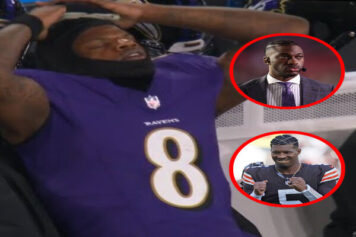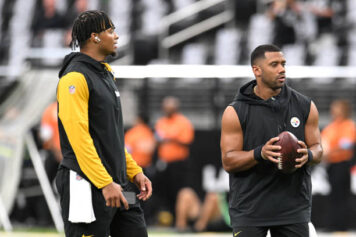The 2018 Heisman vote signified a cultural shift in the philosophy of college football and an appreciation for quarterbacks of color.
A handful of Black quarterbacks have gotten their Heisman shines over the years, but never before have the three Heisman finalists been men of color until this season.
Oklahoma quarterback Kyler Murray edged out Alabama’s Tua Tagovailoa and Ohio State’s QB Dwayne Haskins for the hardware on Saturday. Murray and Haskins are African-American and Tagovailoa is from Honolulu, but of Samoan descent.
Kyler Murray, Heisman Trophy winner. pic.twitter.com/5rOdchvY3l
— ESPN (@espn) December 9, 2018
It took 54 years for an African-American quarterback to win the Heisman Trophy in college football. The first award was given to Jay Berwanger, a running back from Chicago in 1935. Back then, they wouldn’t even let a brother into college, so playing college football wasn’t even an option.
Ernie Davis, the first African-American Heisman winner in 1961, was the product of some groundbreaking court cases and the Civil Rights movement of the 60s. Davis opened the floodgates for Heisman -winning Black running backs. USC’s Mike Garrett (1965) and OJ Simpson (1968) followed.
1974-1985 was the Golden Era of college running backs, producing future NFL legends like Marcus Allen, Herschel Walker, Tony Dorsett, and Earl Campbell and Bo Jackson.
During that era, Black running backs won the Heisman every year, with the exception of 1984 when Doug Flutie’s miracle Hail Mary against Miami on National TV won him the award.
But it wasn’t until 1989 that brothers started getting respect for their passing prowess. Houston Cougars run-n-shoot general Andre Ware became the first African-American QB to win a Heisman Trophy.
Today in African American history:
Andre Ware of the University of Houston becomes the first African American quarterback to win the Heisman Trophy. pic.twitter.com/PFcRwhmkEu— Maryville U ABC (@abc_musaints) December 2, 2018
Since then, the Black quarterback has become a more prominent fixture in the college landscape.
Tagovailoa was the favorite for most of the season before a late run by Murray and an unfortunate injury against Georgia derailed his Heisman hopes. Tags is the second Hawaiian-born quarterback to finish as a finalist in the Heisman so he’s already among the barrier-breakers. The first was Tennessee Titans quarterback Marcus Mariota, the only Hawaii-born athlete to win the Heisman Trophy, in 2015.
Tua is also just the third Samoan player in college football history to be a finalist for the Heisman. Notre Dame linebacker Manti Te’o finished second to Johnny Football in 2012.
https://twitter.com/AlabamaDieHards/status/1071461862368256001
As far as Black QBs go, after Ware’s Heisman in ’89, Florida State’s legendary leader Charlie Ward won the award in 1993. It would take 13 years for another Black quarterback to win a Heisman. Troy Smith won the award for Ohio State in 2006. After Smith’s ascension, there was a rush on Black quarterbacks winning the Heisman as Cam Newton and RG3 did it in 2010 and 2011.
“Since 2010, a Black QB has started in National Title game… If that’s the case, why are black QB’s so heavily criticized when it comes to the NFL Draft?”
“If you think that race doesn’t play a part in this, just ask Watson & last year’s Heisman Trophy winner Lamar Jackson” https://t.co/CNdfy3lcX5
— #StopCopCity (@ChuckModi1) January 2, 2018
Jameis Winston endured a sexual assault scandal to win it in 2013. Lamar Jackson did it as a freshman at Louisville in 2014 and now Murray becomes the latest quarterback of color to win the Heisman.
Despite the recent shift in Heisman voting, to have two Black quarterbacks as Heisman finalists is extremely rare. This is just the third time since 1989 when Ware won and West Virginia’s diminutive dynamo Major Harris finished third.
In 1999 Georgia Tech’s Joe Hamilton and Virginia Tech’s Michael Vick finished second and third respectively. In 2016, Lamar Jackson and Deshaun Watson finished 1-2 in the voting.
The trend of Black quarterbacks getting national recognition falls in line with the way the QB position has evolved over the years. Quarterbacks with dual capabilities are all the rave thanks to the NFL success of QB’s such as Russell Wilson and Cam Newton and Deshaun Watson.
Idk if it’s the only. BUT 9 of the last 15 QB’s to be Top 3 Heisman QB vote getters have been PoC, 7 of which are black. With that said, the Heisman has quite a few minority QB finalists and winners over the past few decades https://t.co/YNZRuL4hOG
— Carter B (@CarterthePower) December 8, 2018
The rules changes, implementation of spread offenses and the increased reliance on speed and space have made the QB position — where athleticism and improvisation were once frowned upon and mistaken as a crutch for intellectual shortcomings– perfectly suited for the advanced skill set of the Black athlete.
The 2018 Heisman voting was an example of a cultural shift that’s benefitting and liberating quarterbacks of color.



